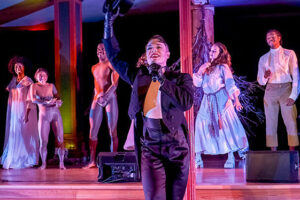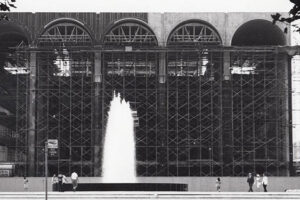
Between staging, music, and material, it’s hard to decide what feels most broken about New York City Opera’s American premiere of Brokeback Mountain, composer Charles Wuorinen’s ill-conceived operatic adaptation of the short story by Annie Proulx. As stands, the entire gambit seems practically beyond repair.
For a limited four-performance run at Jazz at Lincoln Center that opened last night, NYCO presents the work as part of its “Pride Initiative” to produce one LGBT-themed work per season, which kicked off last year with Peter Eötvös’ take on Angels in America.
The bar’s been set pretty low with these two productions, I must say. With this Brokeback, we get not Wuorinen’s original rendition that opened in Madrid in 2014 to lackluster reviews, but instead the scaled-back “chamber version” that premiered two years later at the Salzburger Landestheater.
NYCO had originally commissioned the work but never got to produce it, so the present iteration is now being touted as a special kind of homecoming for the opera. However well-intentioned the revival, though, the adaptation—based on Proulx’s 1997 western tragedy for The New Yorker—is a crappy one, and neither location nor the fact that Proulx herself supplied the libretto can improve much on an opus that not only drops a 12-tone hydrogen bomb on a literary classic, but also bullishly misunderstands what makes forbidden love so delicate and heart-wrenching in the first place.
In a 1965 journal article titled “The Outlook for Young Composers,” Wuorinen—then still a baby-grump-in-training at Columbia—complained of his generation’s lack of opportunities to innovate musically. “It is probably safe to say that the major twentieth century revolutions in musical thought are behind us,” he groused. “Almost every form of departure that can be imagined at present has or is being taken.”
In this context, the young composer (by nature rebellious) finds himself somewhat nonplussed—for whatever new device he may invent with a radical artistic content, he will probably find that it has been already developed by a member of the older generation.
Wuorinen’s artistic recourse was effectively an intellectual one—to go structural and quantitative and dodecaphonic in an age of Aleatoricism, to shove his expressive ideals behind an aloof scrim of atonality.
This all worked quite well for him in the late sixties—as evidenced by his 1970 Pulitzer win for a zeitgeisty four-channel rhythmic work called “Time’s Encomium,” which secured him his cult fan base. Fast-forward to his latest contrarian projects, however, and you get an aging composer who’s all but lost his patience with late-modernism, and who is now foisting his stale, esoteric agenda upon whatever project piques his fancy.
Both in press interviews and in a recent talkback NYCO hosted for the composer and two lead actors roughly a week before opening night, Wuorinen made it clear that a) he’d hated Ang Lee’s 2005 neo-Western film adaptation because it was too long, too treacley romantic, and way, way too on-the-nose and unsubtle; and that b) for his own version, he’d wanted to compose a Brokeback Mountain truer to the source’s laconic portrayal of surly cowboys in Wyoming.
This he and Proulx (who’d herself expressed some doubts about previous appropriations of her fiction) would accomplish by returning to the Ur-text. In Wuorinen’s reboot, plot does indeed adhere to the written source fairly faithfully: as in the original, bewildered hired ranch boys Jack Twist and Ennis Del Mar tussle sexily on Brokeback one night in 1963 and spend an ensuing decade shirking duty and deserting their families for regular “fishing” excursions together.
Also as in the original story, the moral moves tersely, economically, with no one—from star-crossed lovers to their respective sad, indulgent wives—winding up particularly happy or fulfilled.
Wuorinen and Proulx are right to mine the taut original for inspiration. Yet in doing so, they play up the bleakness while missing out on so many terrific (dare I say “operatic”?) opportunities for emotional color and dynamic expression.
And as it turns out, the story provides these opportunities in communicative spades. Upon revisiting Proulx’s 1997 prototype, I was struck not by the terseness, but by how vividly romantic, and even chatty, a lot of it actually is. Consider, for instance, the following post-coital episode that tales place at a certain “Motel Siesta”:
The room stank of semen and smoke and sweat and whiskey, of old carpet and sour hay, saddle leather, shit and cheap soap. Ennis lay spread-eagled, spent and wet, breathing deep, still half tumescent; Jack blew forceful cigarette clouds like whale spouts, and said, “Christ, it got to be all that time a yours a-horseback makes it so goddam good. We got to talk about this. Swear to God I didn’t know we was goin a get into this again—yeah, I did. Why I’m here. I fuckin knew it. Red-lined all the way, couldn’t get here fast enough.”
Or, at the other end of the emotional spectrum, the sentimentally charged dynamics of the shattering scene in which Ennis discovers an old pair of bloody shirts in Jack’s bedroom closet:
The shirt seemed heavy until he saw there was another shirt inside it, the sleeves carefully worked down inside Jack’s sleeves. It was his own plaid shirt, lost, he’d thought, long ago in some damn laundry, his dirty shirt, the pocket ripped, buttons missing, stolen by Jack and hidden here inside Jack’s own shirt, the pair like two skins, one inside the other, two in one. He pressed his face into the fabric and breathed in slowly through his mouth and nose, hoping for the faintest smoke and mountain sage and salty sweet stink of Jack, but there was no real scent, only the memory of it, the imagined power of Brokeback Mountain of which nothing was left but what he held in his hands.
Instead of charge or sentiment, though, Wuorinen’s score delivers an atonal, largely emotionless cipher: a muddy, pointillist bog of pretentiously symbolic chordal “progressions” that go nowhere and motifs so defiantly faint, untextured, and oblique, they’re basically dog whistles for Ivory Tower musicologists.
Try hunting for something recognizably evocative of the georgic landscape—or, for that matter, of the flesh-and-blood figures and working-class feelings that populate this pastoral; you won’t find them. Instead, you’ll encounter repetitive minor-key orchestrations utterly out of step with the subject matter, all winds and groaning strings that could just as easily stand for either country, metropolis, or outer space.
For this reason it was near-impossible Thursday night to evaluate the talents of conductor Kazem Abdullah and his chamber orchestra, so at odds with what was happening onstage were the harmonies and time stamps—the tender line “I wish I knew how to quit you” completely adrift in Wuorinen’s relentless B-C#, B-C#, thomp-thomp-thomp. One never knew if the musicians were playing the right opera at all.
Hardly a sympathetic writer for voice, either, the composer does little to spare those onstage. As the audacious Jack, acclaimed tenor (and Tony Goldwyn ringer) Glenn Seven Allen acts well and sings pleasantly enough, though Wuorinen’s vocal writing offers him little occasion to shape a line. Still, he delivers the most exciting moment of the evening: in a scene played in skivvies exposing his perfect legs, he is in every way a standout.
Canadian bass-baritone Daniel Okulitch brings tragic pathos and a simmering dignity to the role of Ennis Del Mar, and dispatches the final scene with a brooding lyricism that transcends the score.
Yet Wuorinen reserves his most burdensome scrawl for his female protagonists, all played by talented singing actresses who do their best to stay likable despite the composer’s grotesque inventions.
In one of the librettist’s departures from her short story, we watch Ennis’ fiancée Alma try on dresses in anticipation of their wedding. Soprano Heather Buck plays the scene touchingly; it’s an unusually festive moment. But her giddiness is fleeting and never flowers, and within minutes Proulx and Wuorinen return us to the opera’s relentless parade of domestic disputes.
Playing Jack’s boisterous wife Lureen, mega-talented mezzo Hilary Ginther is yet another gorgeous instrument squandered—would that she were starring in something different.
The supporting characters, too, register as passing ghosts here, with all the interest and humanity stomped out of them by the music: Bass-baritone Christopher Job glowered gruffly through the role of Aguirre, the trail boss; mezzo Melissa Parks made a memorable cameo as a bartender in Act I; Kevin Courtemanche and Jenni Banks play up the grieving unfriendliness of Jack’s parents in Act II.
Brokebackis episodic and spans decades, and so it would take a director with ingenuity and a flair for the epic to make sense of its time scheme. Unfortunately, Jacopo Spirei is not that director, as he tends to shortchange on action and, worse, hides all the fun stuff.
Think you’re in for a shivery flash of the erotic? Wrong! In the tent, out of sight. Ready to be wowed by some mountainous vistas? Ha, you wish! The sets and costume designs cooked up by Eva Musil are about as spartan and unimaginative as humanly possible, or, in some cases, unthinkably lazy, all tans and grays, boots and flannels.
Of course Wuorinen and his collaborators couldn’t be troubled to come up with musical interludes for all of the set changes between scenes, so more than a few times the audience gets to cough uncomfortably in silence as pieces are rattled together, light fixtures descend, and as nervous stagehands roll various rooms across the stage.
Wuorinen has made plain his dissatisfaction with what he views as the film’s mishandling of Ennis’ famous line, “Jack, I swear.” But ironically for a composer who relishes subtlety and nuance, in their new version, he and Proulx monkey with the line—“I swear there will never be anybody but you,” sings Ennis in the opera—and thereby strip it of all that made the scene so compellingly ambiguous in the original.
The moment in question appears near the end of the short story. Unable to honor his lover’s wishes to be buried on the mountain (an obvious symbol of their enduring love), Ennis drives to Higgins’ Gift Shop in search of a postcard of Brokeback, which the shopkeeper has to special-order for him.
When it came—thirty cents—he pinned it up in his trailer, brass-headed tack in each corner. Below it he drove a nail and on the nail he hung a wire hanger and the two old shirts suspended from it. He stepped back and looked at the ensemble through a few stinging tears.
“Jack, I swear—” he said, though Jack had never asked him to swear anything and was himself not the swearing kind.
What does Ennis swear? Does it matter? Perhaps what’s importanthere is not what he’s swearing, but that he’s swearing at all.
These men, as envisioned for The New Yorker, are “not the swearing kind”—that is, they’re not normally given to large, melodic pronouncements, or mawkish emotions that overtake but help them burst through the oppressive monochromatic strictures of Midwestern society. But this is a love story; and love—torturous and romantic, qualitative not quantitative, expressive not laconic—is what lies at the spiritual core of Jack and Ennis’ star-crossed relationship.
Maybe what Brokeback Mountain needs is someone who, unlike Charles Wuorinen, is the swearing kind.
Photos: Sarah Shatz

























Comments